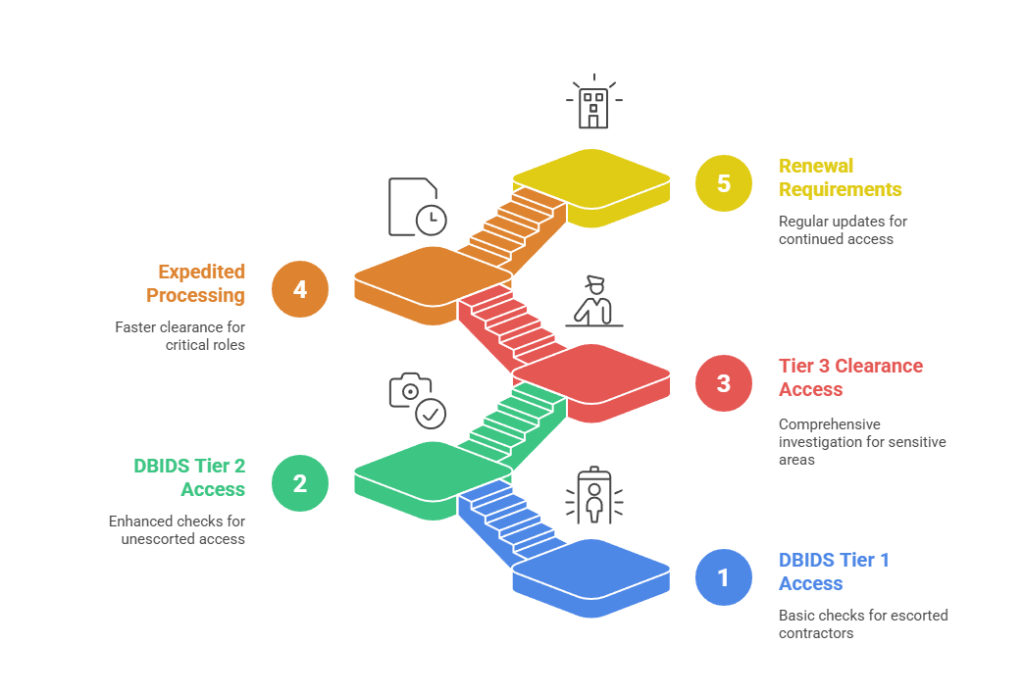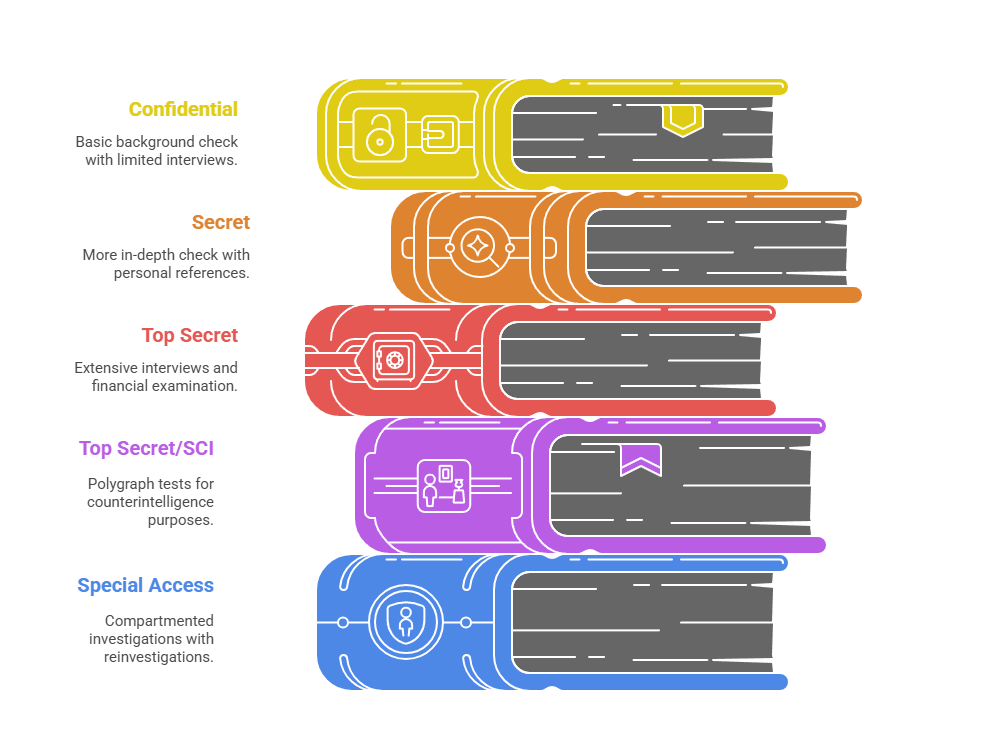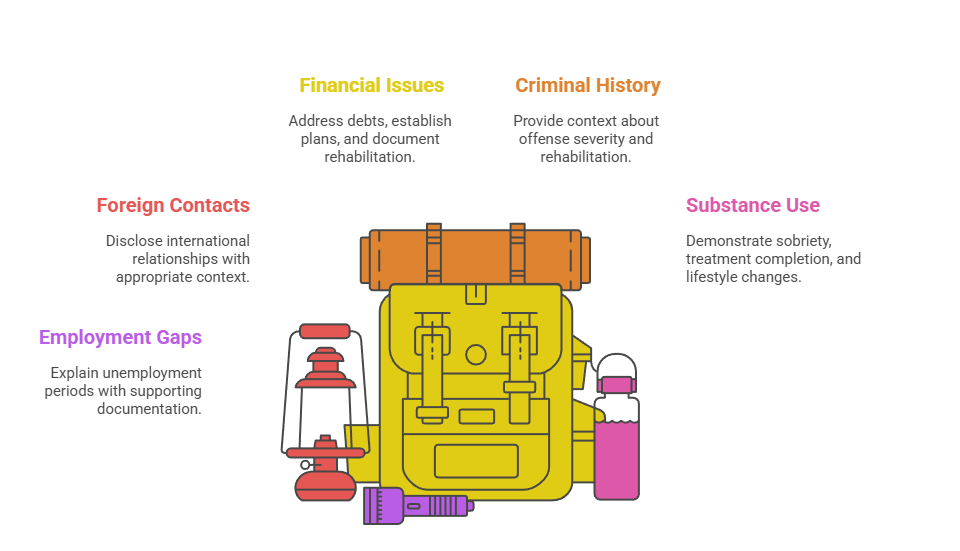Texas hosts the nation's second-largest concentration of federal contractors, with over 18,000 companies supporting military installations like Fort Hood, Fort Bliss, and NASA Johnson Space Center. As a result, these companies require stringent Texas government contractor background checks to maintain compliance. Understanding DCAA compliance, security clearance prerequisites, and federal screening requirements is essential for contractors operating within the state's $47 billion defense and aerospace sector in 2025.
Key Takeaways
- Texas government contractor background checks must comply with federal FAR regulations, NISPOM guidelines, and FCRA requirements for positions supporting DoD, NASA, and other federal agencies.
- Fort Hood, Fort Bliss, Fort Sam Houston, and NASA Johnson Space Center each maintain facility-specific screening requirements beyond standard National Agency Check credentials.
- DCAA background check compliance requires documented verification of education, employment history, criminal records, and credit history extending back 7-10 years depending on clearance level.
- Houston federal contractor background checks differ based on contract tier, with Facility Clearance (FCL) and personnel clearance levels ranging from Confidential to Top Secret/SCI.
- San Antonio DoD contractor screening emphasizes healthcare and cybersecurity positions due to the concentration of military medical facilities and cyber operations centers.
- Texas security clearance background investigations processed through NBIB typically require 6-18 months for completion, with interim clearances available for critical positions.
- Non-compliance with contractor screening requirements results in contract ineligibility, with 23% of Texas contractors experiencing delays due to incomplete background check documentation in 2024.
- Third-party Consumer Reporting Agencies must maintain FCRA compliance, PBSA accreditation, and specific experience with federal contractor screening protocols.
Understanding Texas Federal Contractor Background Check Requirements
Texas government contractor background checks operate under a complex system. Specifically, this system combines federal regulations with site-specific requirements. First, the Federal Acquisition Regulation (FAR) sets baseline screening standards. Then, individual military installations and federal agencies add more protocols based on their mission needs.
As a result, Texas contractors must navigate requirements from multiple oversight bodies. These include the Defense Counterintelligence and Security Agency (DCSA), NASA security divisions, and individual contracting officers. Moreover, each agency maintains distinct protocols. Therefore, understanding these differences prevents costly compliance failures.
The state's unique position creates diverse screening systems. For example, Fort Hood (now Fort Cavazos), Fort Bliss, Joint Base San Antonio, and NASA Johnson Space Center each have specific requirements. Additionally, Fort Bliss's missile defense operations require enhanced technical security. Similarly, NASA maintains strict information protection protocols. Consequently, each installation reflects its operational focus through screening intensity.
Texas DCAA Background Check Compliance Standards

DCAA Verification Requirements for Texas Contractors
Texas DCAA background check compliance centers on documented verification protocols. Specifically, these protocols satisfy Defense Contract Audit Agency standards. Furthermore, DCAA auditors examine contractor screening processes to ensure compliance with Cost Accounting Standards and FAR Part 31. In addition, contractors must maintain clear records showing screening depth, methods, and decision-making reasons for all positions charged to government contracts.
The verification process requires specific documentation. First, contractors must document seven-year employment history confirmations. Next, they must validate education credentials. Additionally, reference checks from supervisors or colleagues are required. Moreover, DCAA compliance requires keeping screening documentation for six years beyond contract completion. Therefore, organized files must show consistent use of screening criteria across all government-funded positions.
| DCAA Compliance Element | Documentation Required | Retention Period |
| Employment Verification | Employer confirmations with dates, titles, and responsibilities | 6 years post-contract |
| Education Credentials | Degree verification from institutions or National Student Clearinghouse | 6 years post-contract |
| Reference Checks | Written records of conversations with professional references | 6 years post-contract |
| Criminal Record Searches | County, state, and federal database results with search parameters | 6 years post-contract |
| Credit History Reviews | Consumer reports with adverse action documentation when applicable | 6 years post-contract |
Texas contractors implementing DCAA-compliant screening programs should establish written policies. These policies must define position risk categories and proper screening depth per category. As a result, proper documentation protects contractors during audits while showing due diligence.
Cost Allowability and Indirect Rate Considerations
Background check expenses represent allowed indirect costs under FAR 31.205-47(f). Specifically, these costs are allowed when used for employee protection purposes and regulatory compliance. However, Texas contractors must properly assign screening costs to overhead pools rather than direct-charging individual contracts. This assignment is required unless specifically authorized by contracting officers.
Contractors should budget properly for screening expenses. Typically, basic background checks cost $50-$300 per employee. In contrast, security clearance investigations range from $3,000-$15,000 depending on level and complexity. Therefore, these costs impact indirect rates and final contract pricing. As a result, efficient screening vendor selection becomes financially important for competitive bidding.
Fort Hood Contractor Screening Requirements
Installation Access and DBIDS Registration
Fort Hood contractor screening requirements begin with Defense Biometric Identification System (DBIDS) enrollment. This enrollment requires sponsorship from contracting officer representatives. The installation implemented enhanced screening protocols in 2023 following security assessments. All contractors must now complete National Crime Information Center (NCIC) checks and sex offender registry searches before receiving installation access credentials.
The installation distinguishes between different access levels with specific requirements:

- DBIDS Tier 1 Access: Basic NCIC check and sex offender registry search for escorted contractors with limited installation privileges.
- DBIDS Tier 2 Access: Enhanced background check including employment verification, education confirmation, and credit checks for unescorted access to non-sensitive areas.
- Tier 3 Clearance Access: Comprehensive personnel security investigation for positions accessing controlled areas, classified materials, or sensitive financial systems.
- Expedited Processing: Available for mission-critical positions through contracting officer verification, typically reducing timelines by 3-5 business days.
- Renewal Requirements: Background checks must be updated every three years for contractors maintaining recurring installation access.
Contractors should initiate background checks 45-60 days before anticipated start dates to accommodate processing delays. Fort Hood's population of 36,000 active-duty personnel and 8,000 contractor employees creates complex access management with typical processing times ranging from 5-15 business days. The installation's provost marshal office maintains authority to deny or revoke access based on derogatory information, making early coordination essential for project success.
Position-Specific Requirements for Fort Hood Support
Fort Hood's diverse mission creates position-specific screening requirements. These requirements vary by directorate and operational area. For example, information technology contractors supporting network operations require Public Trust clearances at minimum. Furthermore, many positions need Secret clearances due to system sensitivity. Similarly, medical facility contractors undergo additional screenings including professional license checks.
Contractors supporting training operations face specialized requirements. These include explosives handling certifications and enhanced criminal history reviews. Additionally, ammunition storage area access requires extra background checks. However, the installation's transition to Fort Cavazos in 2023 did not alter screening requirements. Nevertheless, contractors should reference both names in documentation during the transition period to avoid administrative confusion.
Houston Federal Contractor Background Checks
NASA Johnson Space Center Security Requirements
Houston federal contractor background checks supporting NASA Johnson Space Center follow agency-specific protocols. Notably, these protocols differ from DoD standards. First, NASA requires Position Risk Designation determinations. These determinations sort positions as Low Risk, Moderate Risk, or High Risk. Moreover, the sorting is based on potential impact to agency missions, personnel, or assets.
NASA contractors must complete fingerprinting through authorized channels. Then, results are processed through FBI criminal history databases. They are also checked against terrorist watchlists. Additionally, the Space Center's focus on private technical information creates unique screening needs. As a result, contractors may require extra screening for access to International Traffic in Arms Regulations (ITAR) controlled technology.
| Position Risk Level | Investigation Type | Typical Processing Time | Validity Period |
| Low Risk | National Agency Check | 4-6 weeks | 10 years |
| Moderate Risk | Moderate Risk Background Investigation (MRBI) | 8-12 weeks | 5 years |
| High Risk | Background Investigation (BI) | 12-24 weeks | 5 years |
Overall, processing times for NASA credentials average 8-12 weeks. However, changes occur based on investigation complexity and subject cooperation.
Energy Sector and Port Security Requirements
Houston's energy infrastructure creates extra background check requirements. Specifically, these requirements support critical infrastructure protection. First, the Transportation Security Administration's Transportation Worker Identification Credential (TWIC) program requires background checks for contractors accessing port facilities. These checks involve terrorism database searches and immigration status verification.
Energy contractors working at refineries or pipeline facilities face company-specific screening requirements. Often, these exceed federal minimums due to liability concerns. Furthermore, the Port of Houston's status as the nation's largest petrochemical port creates overlap between TSA requirements and private sector screening programs. Therefore, coordinating multiple screening processes requires 60-90 day lead times.
Texas Security Clearance Background Investigations
Clearance Levels and Investigation Scope
Texas security clearance background investigations follow standard federal protocols. Specifically, these protocols are managed by the National Background Investigation Bureau (NBIB). Recently, the bureau was reorganized as the Defense Counterintelligence and Security Agency's background investigation division. Three primary clearance levels exist: Confidential, Secret, and Top Secret. Moreover, each requires increasingly thorough investigations examining subject history over 7-10 year periods.
Contractors should understand that security clearances belong to the government. They do not belong to individuals or companies. However, eligibility transfers between cleared positions with proper sponsorship. Additionally, Texas's military-heavy economy means roughly 127,000 state residents maintain active security clearances as of 2025. As a result, this creates a competitive edge for contractors with pre-cleared workforces.
The investigation scope grows significantly at higher clearance levels:

- Confidential Clearance: 7-year scope covering credit, criminal history, employment, and education with limited interviews.
- Secret Clearance: 10-year scope including developed references from personal and professional contacts.
- Top Secret Clearance: 10-year scope with extensive field interviews, financial deep-dive, and foreign influence examination.
- Top Secret/SCI: Additional counterintelligence polygraph and lifestyle polygraph tests.
- Special Access Programs: Compartmented investigations with periodic reinvestigations every 5 years.
Texas contractors pursuing cleared contracts should budget 6-18 months for initial investigations. Typically, Top Secret clearances average 12-16 months even under fast-tracked processing.
Common Disqualifiers and Mitigation Strategies
Security clearance adjudication evaluates whole-person concepts rather than applying automatic disqualifiers for most issues. The thirteen adjudicative guidelines under Security Executive Agent Directive 4 examine patterns of behavior, recency of conduct, and evidence of rehabilitation. Financial problems represent the most common clearance denial factor, with 28% of denials in 2024 involving unresolved debt, bankruptcies, or patterns of financial irresponsibility.
Texas contractors can improve clearance success rates by preparing candidates before investigation initiation:

- Financial Issues: Address outstanding debts, establish payment plans, and document financial rehabilitation to demonstrate responsibility and reduce adjudicative concerns.
- Criminal History: Provide context about offense severity, time elapsed since incident, and evidence of rehabilitation; adjudicators consider these factors rather than automatically disqualifying candidates.
- Foreign Contacts: Fully disclose all international relationships including casual friendships, business connections, and family ties with appropriate context about relationship nature and communication frequency.
- Substance Use: Demonstrate sustained sobriety, completion of treatment programs, and lifestyle changes that reduce recurrence risk for alcohol or past drug-related concerns.
- Employment Gaps: Explain periods of unemployment with supporting documentation showing legitimate reasons rather than allowing investigators to draw negative conclusions.
Attempting to conceal negative information creates greater disqualification risk than openly addressing issues with appropriate context. Honest disclosure with documented rehabilitation typically allows clearance approval, while hiding derogatory information raises questions about trustworthiness and judgment that often result in denial.
San Antonio DoD Contractor Screening
Joint Base San Antonio Security Requirements
San Antonio DoD contractor screening covers Joint Base San Antonio's three locations. These include Fort Sam Houston, Lackland Air Force Base, and Randolph Air Force Base. Moreover, each location has distinct mission focuses creating specialized screening requirements. For example, Fort Sam Houston's concentration of military medical facilities requires healthcare contractors to undergo additional credential verification. This includes OIG exclusion list checks beyond standard security requirements.
The consolidated joint base structure put in place common access card (CAC) alternatives for contractors. This was done through the DBIDS program. However, individual installations maintain authority to impose extra requirements based on mission needs. Therefore, contractors supporting the Defense Health Agency or Brooke Army Medical Center must comply with both security requirements and healthcare credentialing standards.
Joint Base San Antonio processes roughly 12,000 contractor access requests annually. Approval timelines range from 5 days for basic access to 90+ days for positions requiring security clearances. As a result, contractors should coordinate with installation security offices and contracting officer representatives early in proposal development.
Cybersecurity and Healthcare Position Requirements
San Antonio's emergence as a military cybersecurity hub creates specialized screening for technology contractors. The National Security Agency's Texas Cryptologic Center and Air Force cyber operations drive these requirements. Healthcare contractors supporting San Antonio military medical facilities face unique screening that combines security requirements with clinical credentialing.
Position-specific screening requirements include:

- Cybersecurity Contractors: Secret clearances at minimum, with many roles requiring Top Secret/SCI access due to mission sensitivity and emphasis on technical skill verification.
- Clinical Staff: State licensure verification, National Practitioner Data Bank queries, and OIG exclusion list checks beyond standard security requirements.
- Administrative Personnel: Standard background checks with enhanced financial responsibility emphasis for billing and payment system access.
- IT Healthcare Support: Combined security clearances and HIPAA compliance training verification for electronic health record system access.
- Medical Device Network Specialists: Dual screening for both cybersecurity protocols and healthcare compliance affecting patient care systems.
The intersection of cybersecurity and healthcare creates particularly complex screening requirements for contractors supporting electronic health record systems or medical device networks. Initial screening processes typically consume 90-120 days before receiving full system access.
Implementing Compliant Screening Programs for Texas Contractors

Selecting FCRA-Compliant Background Check Providers
Texas government contractor background checks must comply with the Fair Credit Reporting Act. This applies when using third-party Consumer Reporting Agencies (CRAs). Specifically, FCRA compliance requires contractors to provide candidates with clear disclosure of background check intent. Additionally, written permission must be obtained before starting screening. Furthermore, specific adverse action procedures must be followed when using background check results to make unfavorable employment decisions.
Selecting qualified background check providers requires careful review. Key criteria include FCRA compliance infrastructure, federal contractor screening experience, and industry approval. Moreover, the Professional Background Screening Association (PBSA) approval shows provider commitment to compliance, quality, and ethical standards. Therefore, Texas contractors should verify providers maintain proper data security measures protecting sensitive personal information.
Key provider selection criteria include:
- FCRA Compliance Systems: Automated adverse action letter generation, proper consent documentation, and dispute resolution processes.
- Federal Contractor Experience: Understanding of SF-86 processes, clearance levels, and government-specific verification requirements.
- Verification Thoroughness: Direct source verification rather than database-only checks for employment and education.
- Turnaround Times: Realistic timelines balancing thoroughness with operational needs.
- Technology Integration: API connectivity for applicant tracking systems and compliance management platforms.
Contractors should establish master service agreements with background check providers. This ensures consistent pricing, service levels, and compliance support. In addition, volume discounts become significant for contractors employing hundreds of workers annually.
Documentation and Record Retention Best Practices
Implementing compliant Texas government contractor background check programs requires careful documentation. Specifically, this documentation must satisfy DCAA audit requirements, FCRA compliance duties, and government contract oversight. Contractors should establish centralized systems tracking screening start dates, completion dates, results, and employment decisions. Moreover, digital document management systems with role-based access controls protect sensitive information while ensuring availability during audits.
Record retention requirements combine multiple mandates. First, FCRA requires maintaining adverse action documentation for five years. Additionally, government contracts require preserving personnel files for six years beyond contract completion. Therefore, Texas contractors should put in place retention schedules automatically archiving records at proper intervals. This systematic approach prevents early destruction of required records.
| File Type | Contents | Retention Period | Access Restrictions |
| Personnel Files | Performance reviews, training records, general employment documentation | 6 years post-employment | HR and management |
| Background Check Files | Screening reports, authorizations, adverse action notices | 5 years or 6 years for government contracts | Designated security personnel only |
| Clearance Documentation | SF-86 copies, clearance certificates, periodic review records | Duration of clearance plus 2 years | Facility Security Officer only |
Contractors should conduct annual internal audits of background check programs. These audits review compliance with written policies and consistency of screening criteria use.
Cost Considerations and Budget Planning
Texas government contractor background check costs vary significantly. Specifically, change depends on screening depth, clearance level, and investigation complexity. Basic employment background checks typically cost $50-$150 per candidate. These include criminal record searches, employment verification, and education confirmation. In contrast, enhanced screenings incorporating credit reports and professional license verifications range from $150-$300 per employee.
Security clearance investigations involve substantially higher costs. Contractors either absorb investigation expenses or receive government payment depending on contract structure. For example, Confidential clearances cost roughly $3,000-$5,000 when processed through DCSA. Similarly, Secret clearances range from $5,000-$8,000. Meanwhile, Top Secret investigations exceed $10,000-$15,000 for thorough field investigations.
Contractors should budget for hidden costs beyond direct investigation fees. For instance, employee time spent completing SF-86 forms averages 8-12 hours for complex applications. This represents $400-$1,200 in labor costs per candidate at median Texas wages. Additionally, investigation delays prevent cleared employees from billing government contracts. This creates opportunity costs during the 6-18 month clearance process. Furthermore, some contractors maintain employees on overhead during clearance processing for critical positions.
Strategic cost management approaches include maintaining cleared workforces, hiring pre-cleared candidates, and putting in place tiered screening approaches. Moreover, negotiating master service agreements with screening providers reduces per-screen costs. Similarly, efficient SF-86 completion through templates and training speeds up form preparation, reducing labor costs.
Conclusion
Texas government contractor background checks represent complex compliance requirements. Specifically, these requirements combine federal regulations, facility-specific protocols, and industry best practices. Success requires understanding DCAA compliance standards, security clearance processes, and FCRA duties. Additionally, Texas contractors must put in place documented screening programs satisfying audit review. Therefore, strategic investment in compliant screening programs, qualified personnel, and proper documentation creates competitive edges in the state's $47 billion federal contracting marketplace while ensuring mission success and regulatory compliance.
Frequently Asked Questions
How long do Texas government contractor background checks typically take?
Basic background checks for Texas government contractors typically take 5-10 business days when processed through professional screening firms. However, security clearance investigations require substantially longer timelines. Specifically, Confidential clearances average 3-6 months, Secret clearances take 6-10 months, and Top Secret clearances require 12-18 months for completion. Additionally, interim clearances may be granted for critical positions within 30-60 days while full investigations proceed.
What disqualifies someone from passing a government contractor background check in Texas?
No single factor automatically disqualifies candidates from Texas government contractor positions. However, felony convictions involving dishonesty, violence, or national security create substantial obstacles, particularly for recent offenses. Additionally, unresolved financial problems including bankruptcies, significant delinquent debts, or tax liens suggest potential security risks. Furthermore, illegal drug use within the past year, falsification of application materials, or improper handling of classified information typically result in disqualification.
Do all Texas federal contractors need security clearances?
Not all Texas federal contractors require security clearances. Specifically, only positions involving access to classified national security information need clearances. Many federal contracts involve unclassified work requiring only basic background checks. However, contractors supporting defense installations or aerospace programs frequently encounter clearance requirements, with roughly 35% of Texas federal contractor positions requiring some level of security clearance.
How much do government contractor background checks cost in Texas?
Texas government contractor background check costs range from $50-$300 for basic employment screening. In contrast, security clearance investigations cost substantially more, with the government typically funding these investigations. Specifically, Confidential clearances cost $3,000-$5,000, Secret clearances cost $5,000-$8,000, and Top Secret clearances cost $10,000-$15,000. Additionally, contractors may absorb these costs initially with government payment upon contract award.
Can Texas contractors perform their own background checks or must they use government systems?
Texas contractors must use government investigation systems for security clearances processed through DCSA's National Background Investigation Services. However, for non-cleared positions requiring basic background screening, contractors may engage third-party Consumer Reporting Agencies meeting FCRA compliance standards. Contractors cannot conduct proper clearance investigations independently. These require government investigator access to law enforcement databases and intelligence holdings unavailable to private entities.
How often must government contractor background checks be renewed in Texas?
Background check renewal requirements for Texas government contractors vary by clearance level and position sensitivity. Specifically, security clearances require periodic reinvestigation every 10 years for Confidential and Secret levels. In contrast, Top Secret clearances require reinvestigation every 5 years under current continuous vetting programs. Additionally, basic installation access credentials through DBIDS typically require renewal every 3 years.
What is the difference between DCAA background check compliance and security clearance investigations?
DCAA background check compliance focuses on verifying contractor screening processes meet Cost Accounting Standards and FAR requirements. It emphasizes documentation, cost allowability, and consistent policy use. In contrast, security clearance investigations review individual trustworthiness for access to classified information. They examine criminal history, financial responsibility, foreign contacts, and personal conduct. Overall, DCAA audits contractor screening programs while DCSA conducts security clearance investigations.
Can contractors with past financial problems obtain security clearances in Texas?
Contractors with past financial problems can potentially obtain security clearances if they show improvement. Specifically, developed payment plans and responsible current financial management are essential. Security clearance review uses whole-person concepts rather than applying automatic disqualifiers. Therefore, reviewers consider the circumstances causing financial problems, steps taken toward resolution, and likelihood of recurrence.
Additional Resources
- Defense Counterintelligence and Security Agency - Personnel Security
https://www.dcsa.mil/is/personnel-security/ - Federal Acquisition Regulation (FAR) Part 52.204-9 - Personal Identity Verification
https://www.acquisition.gov/far/part-52 - National Industrial Security Program Operating Manual (NISPOM)
https://www.federalregister.gov/documents/2020/12/21/2020-27698/national-industrial-security-program-operating-manual-nispom - Professional Background Screening Association - FCRA Compliance
https://www.pbsa.org/compliance/ - NASA Security and Facility Requirements
https://www.nasa.gov/offices/opc/security_and_facility_requirements.html - Federal Trade Commission - Fair Credit Reporting Act Guidance
https://www.ftc.gov/legal-library/browse/statutes/fair-credit-reporting-act

GCheck Editorial Team
Meet the GCheck Editorial Team, your trusted source for insightful and up-to-date information in the world of employment background checks. Committed to delivering the latest trends, best practices, and industry insights, our team is dedicated to keeping you informed.
With a passion for ensuring accuracy, compliance, and efficiency in background screening, we are your go-to experts in the field. Stay tuned for our comprehensive articles, guides, and analysis, designed to empower businesses and individuals with the knowledge they need to make informed decisions.
At GCheck, we're here to guide you through the complexities of background checks, every step of the way.





